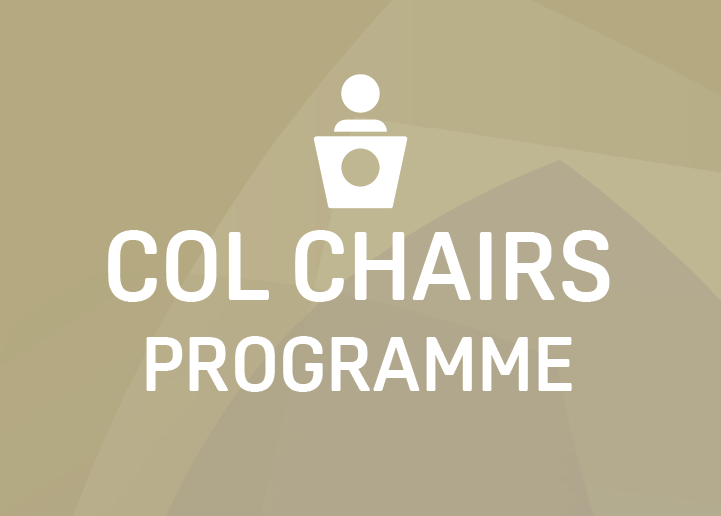Purpose
COL acknowledges its duty of care to protect and promote the welfare of any persons it comes into contact with through its work.
COL recognises that unequal power dynamics in relationships, particularly gender inequality, can lead to increased vulnerability. COL commits to creating a safeguarding environment where potential risks are identified, considered and minimised with clear processes and procedures in place for redress.
This Policy lays out the commitments made by COL, and informs staff, non-staff personnel, consultants, contractors, and partner organisations and institutions of their responsibilities, in relation to safeguarding.
Policy Statement
COL values and maintains an organisational culture that is respectful, ethical and fair.
COL commits to treating everyone equally, irrespective of sex, age, race, national or ethnic origin, colour, religion, sexual orientation, gender identity or expression, or disability.
COL has zero tolerance towards any form of harm, including, but not limited to, sexual exploitation, sexual abuse, sexual harassment, child sexual exploitation, child abuse or child labour, and will take all reasonable steps to safeguard any person linked to the delivery of its work, either by its staff, non-staff personnel, contractors, consultants, or by any partner organisation or institution, from any form of sexual exploitation, abuse and harassment.
Safeguarding in this Policy means the steps that COL takes to keep all persons with whom it works and comes into contact with through its activities (including children and at-risk adults) safe from sexual exploitation, abuse, harassment and other forms of harm caused by the misuse of power. It includes actions for raising awareness as well as preventing, responding to and reporting on the harm caused by staff, non-staff personnel, contractors, consultants, and partner organisations and institutions.
Definitions
Sexual exploitation – actual or attempted abuse of a position of vulnerability, power or trust, for sexual purposes, including but not limited to, profiting monetarily, socially or politically from the sexual exploitation of another.
Sexual abuse – the actual or threatened physical intrusion of a sexual nature whether by force or under unequal or coercive conditions.
Child sexual exploitation includes sexual relations with a child, in any context, defined as a human being below the age of 18 years. Child sexual exploitation and abuse constitute acts of serious misconduct and are therefore grounds for disciplinary action up to and including termination, and may result in criminal proceedings
Sexual harassment – any conduct, comment, gesture, or contact of a sexual nature, whether on a one-time basis or in a continuous series of incidents:
- that might reasonably be expected to cause offence or humiliation to the individual; or
- that might reasonably be perceived by the individual as placing a condition of a sexual nature on employment or on any opportunity for training or promotion.
Child abuse – child abuse includes all forms of physical and emotional ill-treatment, sexual abuse, neglect or negligent treatment, and commercial or other exploitation resulting in actual or potential harm to the child’s health, survival, development or dignity in the context of a relationship of responsibility, trust or power.
Child labour – child labour is work that deprives children of their childhood, their potential and their dignity, and that is harmful to physical and mental development. It refers to work that is mentally, physically, socially or morally dangerous and harmful to children and interferes with their schooling by depriving them of the opportunity to attend school, obliging them to leave school prematurely or requiring them to attempt to combine school attendance with excessively long and strenuous work. Whilst child labour takes many different forms, the worst forms of child labour Include:
- all forms of slavery or practices similar to slavery, such as the sale and trafficking of children, debt bondage and serfdom and forced or compulsory labour, including forced or compulsory recruitment of children for use in armed conflict;
- the use, procuring or offering of a child for prostitution, for the production of pornography or for pornographic performances;
- the use, procuring or offering of a child for illicit activities, in particular for the production and trafficking of drugs as defined in the relevant international treaties;
- work which, by its nature or the circumstances in which it is carried out, is likely to harm the health, safety or morals of children.
Examples of a safeguarding concern or allegation can include but are not limited to:
- Sexual exploitation, abuse and harassment–this includes rape, sexual assault, indecent exposure, forcing a person to engage in prostitution or pornography, inappropriate looking or touching
- Online or cyberbullying
- Abuse of trust
- Psychological and emotional abuse
- Modern slavery
- Child labour
If a potential safeguarding concern under this Policy involves workplace bullying or harassment, including workplace sexual harassment, COL staff should first report the behaviour in accordance with COL’s Harassment and Discrimination Policy.
Scope of the Policy
This Policy applies to i) COL and CEMCA staff, ii) non-staff personnel, comprising individuals working with COL through an established arrangement such as interns, volunteers, mentors, Chairs, or other similar assignments, iii) individual consultants and contractors with a contractual arrangement with COL; and iv) partner organisations and institutions that deliver activities and services on behalf of COL.
This Policy does not cover safeguarding concerns in the wider community not perpetrated by COL staff or associated non-staff personnel, consultants, contractors and partner organisations and institutions.
Responsibilities
COL will:
- Ensure all staff, non-staff personnel, contractors, consultants, and partner organisations and institutions have access to, are familiar with, and know their responsibilities within this Policy.
- Implement appropriate safeguarding procedures when recruiting, managing and deploying staff, non-staff personnel, contractors and consultants.
- Provide its staff with the appropriate level of training and/or learning opportunities to help recognise, and respond to signs of sexual exploitation, abuse, harassment and other forms of harm. COL will also take steps to ensure that all staff understand their roles and responsibilities with respect to safeguarding individuals, what is acceptable and unacceptable behaviour, and their role in safeguarding the persons they come into contact with through the course of their work.
- Raise awareness with its non-staff personnel so they understand their role under this Policy and in order to minimise the risk that COL’s programmes might pose to the persons associated with these programmes, including the persons the programmes are meant to serve.
- Follow up on reports of safeguarding concerns promptly and according to due process.
COL staff, non-staff personnel, contractors and consultants will be expected to:
- Contribute to creating and maintaining an environment that prevents sexual exploitation, abuse/harassment, and other safeguarding violations and promote the implementation of this Policy.
- Report any concerns or suspicions to COL regarding any suspected or alleged violations of this Policy, in accordance with the reporting procedures set out below.
COL partner organisations and institutions will be expected to:
- Ensure that their staff adhere to this Policy (or, by prior agreement, their own substantially similar safeguarding policy) when delivering activities and services on behalf of COL.
- Take all reasonable steps to safeguard the persons they come into contact with through the course of their work for COL and keep COL informed of any decisions or actions taken with respect to the enforcement of this Policy.
Core Principles
This Policy is aligned with the six core principles of the Inter-Agency Standing Committee relating to a Code of Conduct to prevent sexual exploitation and abuse.
- Sexual exploitation and abuse by humanitarian workers constitute acts of gross misconduct and are therefore grounds for termination of employment.
- Sexual activity with children (persons under the age of 18) is prohibited regardless of the age of majority or age of consent locally. Mistaken belief regarding the age of a child is not a defence.
- Exchange of money, employment, goods, or services for sex, including sexual favours or other forms of humiliating, degrading or exploitative behaviour is prohibited. This includes exchange of assistance that is due to beneficiaries.
- Any sexual relationship between those providing humanitarian assistance and protection and a person benefitting from such humanitarian assistance and protection that involves improper use of rank or position is prohibited. Such relationships undermine the credibility and integrity of humanitarian aid work.
- Where a humanitarian worker develops concerns or suspicions regarding sexual abuse or exploitation by a fellow worker, whether in the same agency or not, he or she must report such concerns via established agency reporting mechanisms.
- Humanitarian workers are obliged to create and maintain an environment which prevents sexual exploitation and abuse and promotes the implementation of their code of conduct. Managers at all levels have particular responsibilities to support and develop systems which maintain this environment.
Policy Actions
COL will make every reasonable effort to minimise the risk that the operation of COL’s programmes could pose by preventing harm through:
- Leadership: appropriate safeguarding skills, oversight and accountability are built into the roles and responsibilities of staff at different levels.
- Discussion: open discussion of safeguarding issues is encouraged within teams and programmes on a regular basis.
- Assessment: Staff with programme responsibility will regularly assess programme areas to identify situations that might put an individual at risk and develop mitigation strategies to reduce and/or manage the risks.
- Safe recruitment: measures are in place to prevent the employment of staff that pose a safety risk, including a criminal record or other background check, in accordance with COL requirements, for example, in direct contact with children or at-risk adults.
- Public communications: ensure COL’s public presence does not inadvertently put persons at risk through the unintended use of digital images or of other communications material.
- Privacy protection: Personal information of its stakeholders will be treated with the highest level of confidentiality.
COL will maintain robust reporting and follow up mechanisms to address any reports of concerns, incidents and allegations of a safeguarding nature.
- Complaints mechanism:Staff, non-staff personnel, contractors, consultants, staff of partner organisations and institutions, and individual stakeholders of COL’s work may make a confidential report as per the Reporting Procedure below.
- Timely reporting and response: All reports of suspicions and allegations of sexual exploitation, abuse, harassment, and other forms of harm will be taken seriously and responded to swiftly and appropriately, including formal reporting to official authorities as appropriate. COL may make use of independent external experts to investigate complaints, at its discretion.
- Confidential records: Confidential, detailed and accurate records of all safeguarding matters will be logged, maintained and securely stored.
- Protection for whistleblowers: Individual(s) who raise or disclose concerns will be protected from retaliation in accordance with COL’s Whistle Blowing Policy.
Reporting
Individuals should immediately report incidents of actual or suspected sexual exploitation, abuse or harassment relating to this Policy to:
COL’s Director: Finance and Corporate Services (the “HR Director”) at:
a) a secure email address for raising all concerns or
b) by calling the confidential line of the HR Director at +1 604 775-8254 or
c) by writing to: COL Director: Finance and Corporate Services at 505 Burrard Street, Suite 1650, Box 5, Vancouver, BC V7X 1M6, Canada, with the correspondence marked as ‘Confidential’. OR
Where it would not be appropriate to report a concern directly to COL, for example where the individual believes s/he may be, or s/he is being, subjected to retaliation by COL, the individual may contact SeeHearSpeakUp, an agency appointed by COL to provide an external and independent confidential reporting service available 24 hours every day. The contact methods are provided below:
a) a secure email address at Report@seehearspeakup.co.uk or
b) by calling one of these numbers:
- Canada – 1 866 606 5211
- Asia Region – +44 (0)1224 379303
- Africa Region – 0027 21 672 2322
- Pacific Region – 400 120 2442
- Caribbean Region – 00 44 121 629 0703
c) Web reporting can be accessed from here: https://www.seehearspeakup.co.uk/en/file-a-concern
Concerns raised with SeeHearSpeakUp will be passed to the HR Director (or President & CEO if the concern involves the HR Director) within COL to consider potential investigation. Personal details of the person reporting a concern, such as name and contact information will not be shared unless consent is given to SeeHearSpeakUp to share these details with the designated senior officers at COL.
If there is a concern that COL has failed to initiate or implement a proper investigation, the individual may report their concern in writing to the ‘Confidential Attention’ of the Chair of the Audit Committee (the “Chair”) at:
Chair of the Audit Committee, Board of Governors
CONFIDENTIAL
c/o 505 Burrard Street, Suite 1650, Box 5
Vancouver, BC V7X 1M6, Canada
Investigation
The HR Director (or the President & CEO or Chair, if applicable) will assess whether the complaint discloses a matter that is covered under this Policy. If it does, then the HR Director (or the President & CEO or Chair) will review the information provided and either escalate the matter to an internal investigator (or committee) to investigate the complaint or designate an appropriate external investigator to conduct the investigation in accordance with this Policy as follows:
- The investigator(s) will determine process and timeline but will endeavor to complete the investigation as quickly as practicable within a six-week timeframe from the date the incident was reported.
- Once the investigation is concluded, based on the findings, the HR Director (or the President & CEO or Chair) will provide any investigation report to the parties for further action, if necessary, as determined at the discretion of COL.
- Once an investigation has been completed, and subject to privacy and other legal obligations, the HR Director (or the President & CEO or Chair) will notify the reporting individual with the results of the investigation.
- If a complaint indicates that illegal activity has occurred, the HR Director (or the President & CEO or Chair) may bring the complaint directly to the police or other law enforcement or regulatory agency, as appropriate.
- The above procedure and any investigation carried out is intended to be flexible in order to respond to the specific circumstances at issue. The intent is that a complaint of a safeguarding concern will be managed by a person or committee of people within COL who are not personally involved or otherwise in a conflict of interest with respect to the matter, recognising that COL is a small organisation with limited human and financial resources. COL reserves the right to engage in a different procedure as deemed appropriate in any given circumstance.
Actions
A finding of non-compliance with this Policy by staff, non-staff personnel, contractors and consultants, or partner organisations and institutions may result in disciplinary action up to and including termination of employment in the case of a COL staff member, and termination of the engagement or contractual arrangements or other appropriate action in the case of non-staff, contractors, consultants, or partner organisations and institutions.
The making of false, malicious, bad faith or baseless allegations under this Policy may result in disciplinary action up to and including termination of employment in the case of a COL staff member, and termination of the engagement or contractual arrangements or other appropriate action in the case of non-staff personnel, contractors, consultants or partner organisations and institutions.
The Audit Committee of the Board of Governors of COL will be informed of all reported incidents, with the identity of individuals protected. COL reserves the right to report incidents to other parties as may be required.
Confidentiality & Anonymity
Given the technical and logistical requirements of investigating a complaint, anonymous complaints may be difficult to resolve when additional information is required. Whistle blowers will be encouraged to co-operate with an investigation and to provide their identity and contact information when making a Complaint in order to allow for a proper investigation, if necessary.
No Retaliation
No individual who in good faith reports a complaint under this Policy or participates in an investigation shall suffer harassment, retaliation or adverse consequences.
Anyone who is found to have retaliated against a person for making a report under this Policy or for participating in an investigation under this Policy in good faith will be subject to corrective action as necessary, including discipline up to and including termination of employment in the case of a COL staff member, and termination of the engagement or contractual arrangements or other appropriate action in the case of non-staff personnel, contractors, consultants, or partner organisations and institutions.
Policy Review
This Policy will be reviewed annually. All updates to the Policy will be circulated to staff and made available on the COL website.
Revised: 2 June 2025





